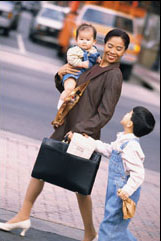 For generations, mothers have chosen to defy traditional gender roles and take jobs outside of their homes. Today, up to 61 percent of mothers can be classified as working mothers, and a recent study found that more people than ever are accepting working mothers.
For generations, mothers have chosen to defy traditional gender roles and take jobs outside of their homes. Today, up to 61 percent of mothers can be classified as working mothers, and a recent study found that more people than ever are accepting working mothers.
What People Think About Working Mothers
San Diego State University (SDSU) recently analyzed data to see how attitudes toward women and their work and family roles have changed since the 1970’s. The researchers studied data from surveys 600,000 12th graders and adults took between 1976 and 2013.
Based on the data, researchers found that Millennials, people born between 1981 and 1996, accept working mothers at a significantly higher rate than people of the same age in previous generations. In the 1970’s, 59 percent of people surveyed believed the preschool children of working mothers would suffer. That number dropped to 34 percent in the 1990’s and 22 percent in the 2010’s.
Likewise, older adults have also shifted their opinions of working mothers. In 1977, 68 percent of the adults who were surveyed believed that preschool children of working mothers would suffer. Forty-two percent believed the same thing in 1998, and 35 percent believed it in 2012.
What the Survey Means for You
One of the study’s lead authors Dr. Jean M. Twenge, a psychology professor at SDSU, and lead researcher and doctoral student Kristin Donnelly point out that the data reflects how more people today are more willing than ever to accept working mothers. The study’s results also show that more Americans now support men and women holding both the same workplace and child rearing responsibilities.
For hiring personnel and anyone looking for a job, the survey results are hopeful. It means that working mothers are less likely to be discriminated against. It also opens up the possibility for improved workplace benefits for parents who juggle a job and family.
Whether or not you’re a working mother, these research results are good news for you. Talk to your human resources manager about potential changes to your benefits package as you support working mothers.





